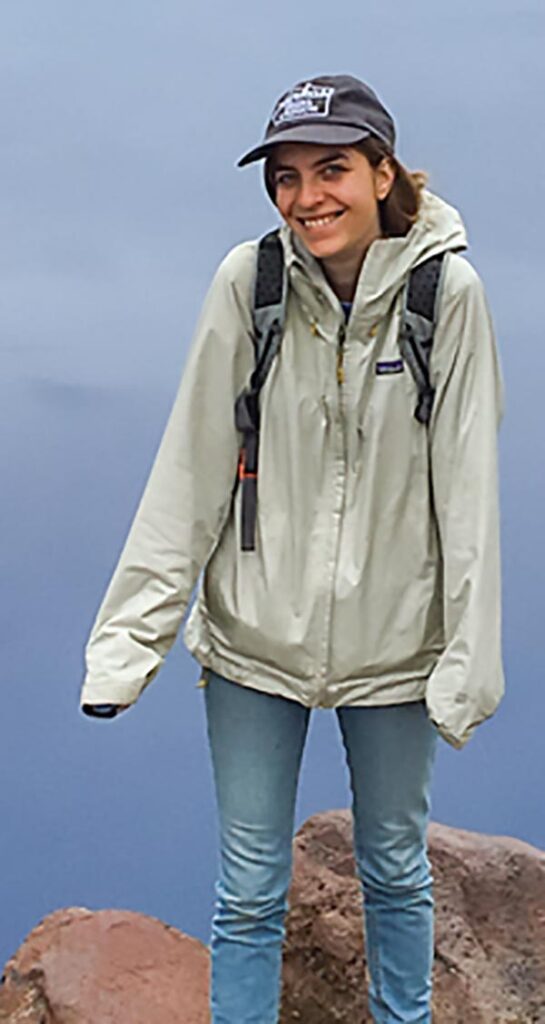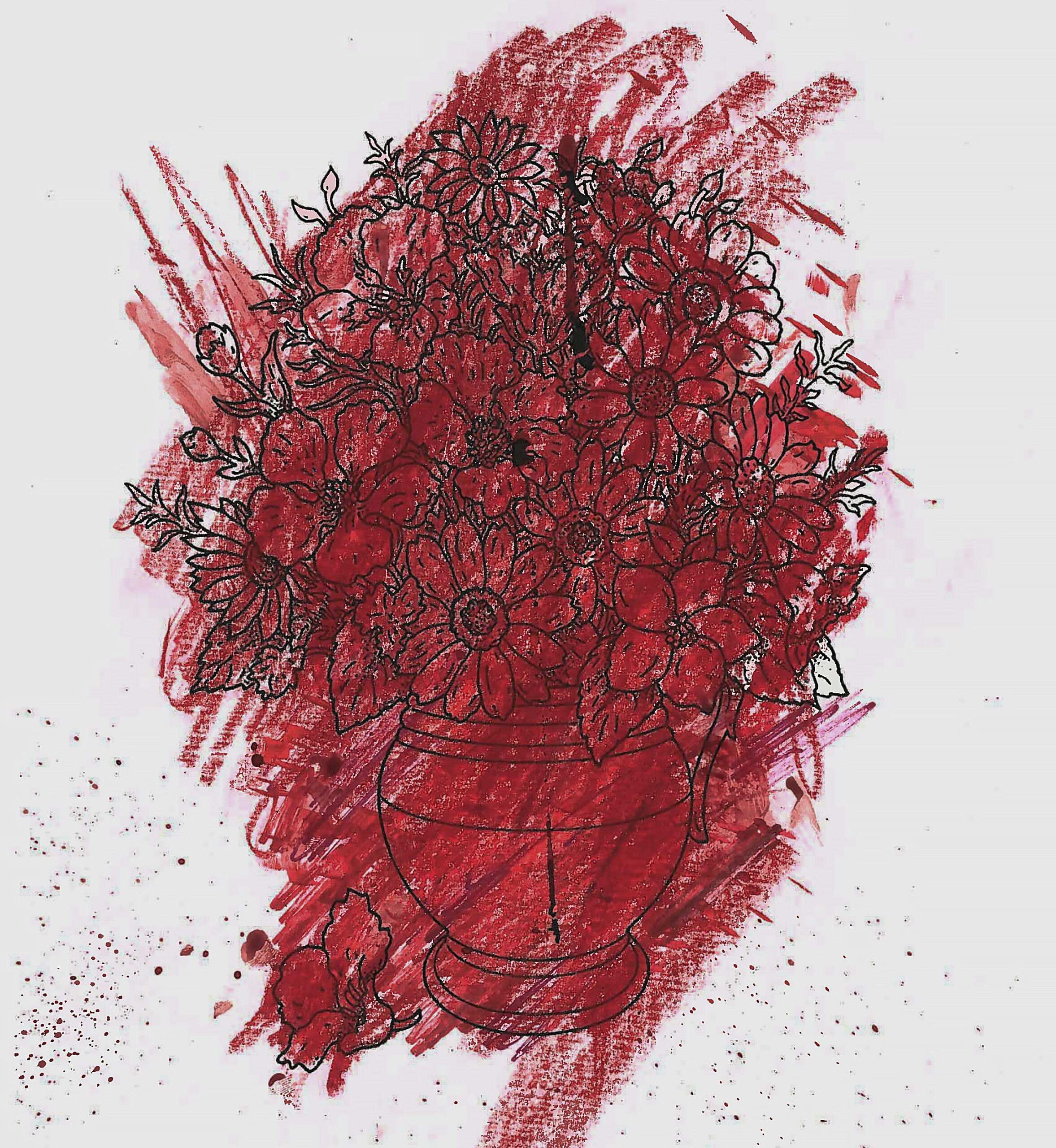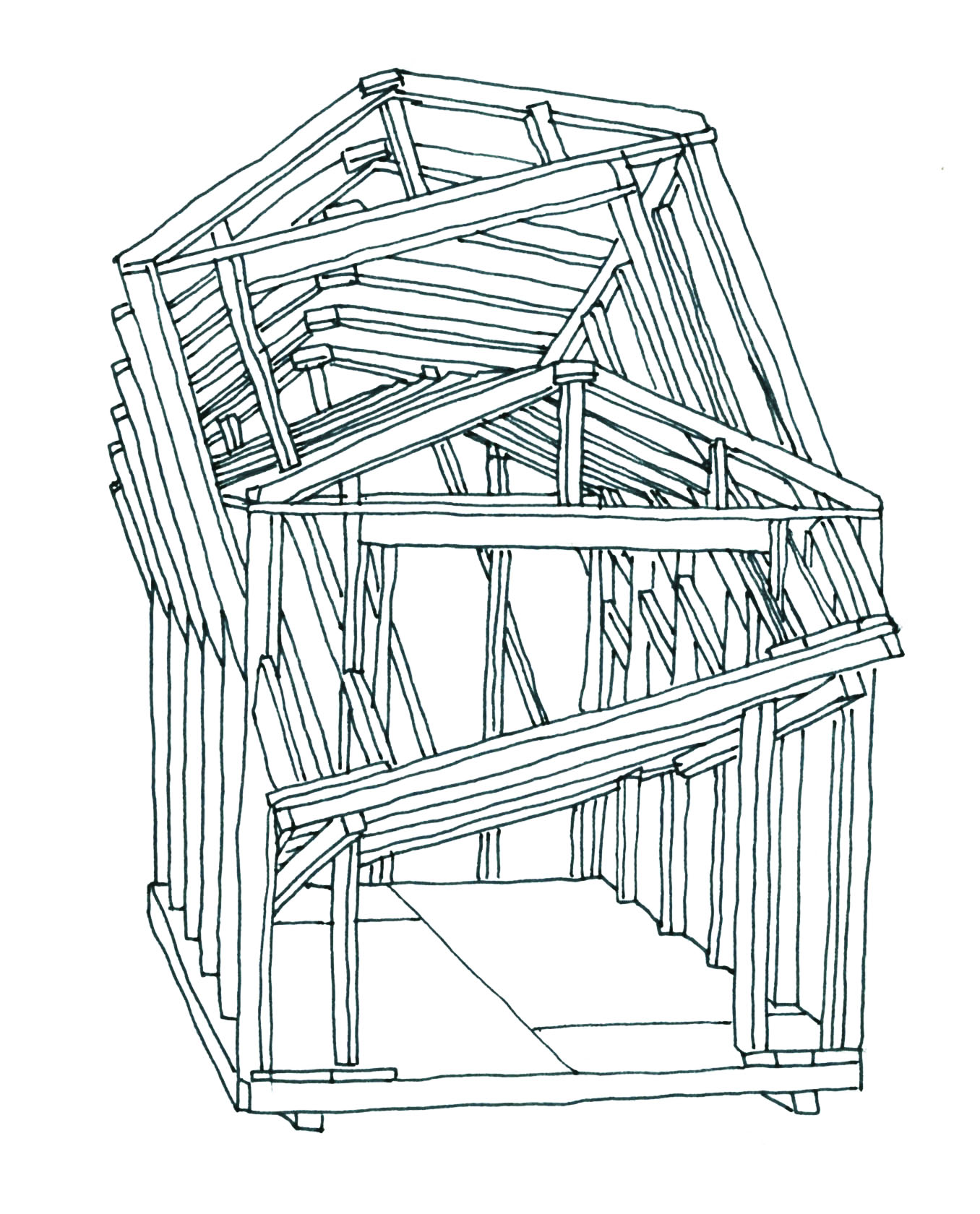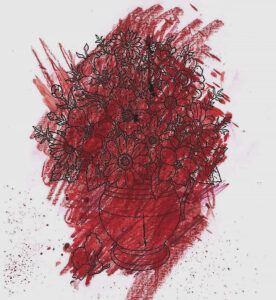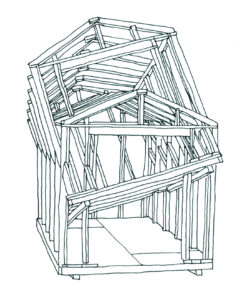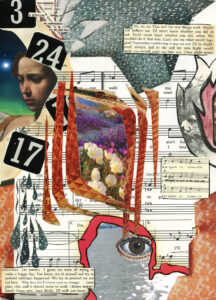The Rut
by Cody Bowie
Running running. Hands held to temples like antlers. Pops like snapped branches echo through the valley as Eli cracks his knuckles. As a child I circled the dead body of an elk, picked wildflowers from its hollow eye sockets. Now Eli chases me, reaches out for my skirt, lays me back onto the grass, reaches up my thighs.
The rut is coming. Harems are forming, colonies of skittish females and their young calves, breath a fog shrouding wet nostrils. Where they bed, by dawn, a thick frost cracks under hooves. The bugle of bull males, reedy like an overblown flute, drift over the valley. Young males are driven away from the harem, scattering like starlings
Now, silence. Harems not yet formed. When Eli presses into me, a wetness, a hollow ache—a searing pain. “It’s not supposed to hurt every time,” he says when he’s done. “Have you talked to your sister about it?” He doesn’t ask about a doctor.
Later, in bed: we roll together, my body his big spoon. He brings the back of my hand to his lips.
“What does it feel like?” he asks. It takes a moment to realize he is asking about before.
A fan chills our damp backs. “It feels like I am afraid of my own body,” I say, a whisper.
*
Stone fruit on the mantle—an extravagance we cannot afford. Their flesh cut away, arranged in a bowl. Eli passes the stones to me, small sticky weights in my pockets.
“How is it today?” Eli asks. I’m on my period; all last night he listened to my groans, reached over and stroked my board-stiff body.
“Better,” I lie. He places the bowl of fruit salad in front of me with toast unbuttered. When I sit, my hip cracks, relieved that I am moving again. The fruit is mild and filling, underripe, but I like the crunch. I pull a tatter of red velvet out from between my teeth
“Peach?” he asks.
“I’m shedding,” I say. “Like elk antlers.” When he smiles, my stomach clenches.
We are studying the elk rut for science. Eli wants to pitch an article to a science magazine about the effect of noise pollution on elk bugles. “They used to sound like this,” he says, demonstrating (a low, mournful whine, eerie, off-tune). “Now they sound more like this” (a pregnant screeching, his vocal cords strained). It all has to do with the logging company, the whirring motors of cutters and chainsaws bleeding into the valley. The elk have to compete to be heard.
I crack a barley seed from my toast, let the grainy smell linger. “You’ve already convinced me,” I say. We gather our things: binoculars, field guides, waterproof notebooks, water bottles. We hike several miles to the valley, slink toward its edge on our bellies. The harem is bigger than before. On the outskirts, juvenile males still mope, crying. The harem is eleven cows strong, a big one. They graze cooly, ignoring the crying. Nearby a male rubs his antlers on the ground.
This is why I’m watching the elk, although Eli doesn’t know it: I want to join the harem. I want to disappear into their numbers, absorb their strength. Walk among them, hold my hand against their noses. Catch their breath between my fingers.
We watch with binoculars, belly down in the grass on the cusp of the valley. The mud is a supple second skin that shines as they move. They coat their hides in urine, a pungent perfume used to attract the females. Beneath the mud-and-urine, the bulls stay cool, insulated from the hot spell. When they dry, they become something else: giant creatures, drying in patches, mud fracturing off like mange. They rise from their wallows reborn, heady with testosterone, snorting. Eli feels it too. I inch away from him ever so slightly, away from his maleness. But when we return home, he gently removes my socks and everything is back to normal.
*
First date: Oregon Country Fair, sweltering in July. We passed pockmarked mountains where fires had burned, miles and miles of Christmas tree farms. I didn’t know then how many Christmases we would have together. The trees were yearlings, not taller than my shins. Eight years would pass before they were harvested. Eli chanced a touch when he put the car into park—his fingers brushing against my thighs—and I didn’t push away. We held hands as we walked along the dusty trail toward the entrance.
Costumes everywhere. Men in flowing dresses, beads, women in lipstick. A butterfly, a dragonfly, princesses. Topless women too, small petal stickers obscuring their nipples. Peach breasts. I was embarrassed to look. Eli squeezed my hand, and I wondered if he was thinking of me like that. I felt both underdressed and overdressed in shorts and a T-shirt.
Hummus smeared on pita. Lemonade so tart I screwed up my face. Buffalo cauliflower wings, juice dripping down to my elbow, one greasy tear. There were endless booths of knickknacks: wooden spoons, jewels locked in tarnished metal, painted flower pots, glass bowls. A dragon wandered by, its thirteen sets of children’s legs kicking at stones. “Let’s dance,” Eli said, and for a moment we bobbed to far-off saloon music.
Under the shade of a tree, a tarot booth. Inside the booth, smell of musky candles, sweating bodies, curry. A reprieve from the sweltering. The woman was disappointingly mundane (small, blond, glacial eyes). She kneeled on the other side of a small altar covered in dried flowers and candles. We gave her a sweaty ten dollars and folded our legs.
“Are you ready to look inside yourself?” she asked.
“No thanks. Just blood and guts in there. She is,” Eli said, pointing to me. He squeezed my hand into his.
“Shuffle these cards,” the woman (Orianna, a sign behind her said). “Hold a question in your mind.” I took the cards and fumbled with them. A few fell out as I shuffled. Oriana looked offended. I tried to hold something in my mind, but everything was a jumble. I couldn’t hold a single thread in my mind for long.
Oriana took the deck back, cut it, and let me
arrange the stacks. “Did you focus on a question?” she asked. I nodded. Something flickered behind her eyes—could she tell I was lying? She laid a single card before me.
“The Hanged Man,” she said. “Stagnation. Surrender. Everything comes at the cost of something else. Make your decisions wisely—they cannot be remade.” Unceremoniously, she shooed us from her booth, not even bothering to hold out her tip jar. Could she tell I wasn’t taking it seriously?
“Was that enlightening?” Eli asked, smiling. Although we were back out in the sun, I felt chilled.
“I don’t think I did it right,” I said sheepishly.
He laughed. “I don’t think there’s anything you needed to do. It’s all a racket.” On our left, a local brewery gave out samples. Eli pulled me over. Brothy, sour beer bit away my unease, gave way to pleasure.
*
Eli leaves for work. This is when I sneak back to the elk, careful to skirt around the bulls. Each day the harem allows me a little closer. They are beginning to trust me, to accept me as one of their own. Their ears still twitch when I’m near but with less alarm. I squat on a muddy knoll just twenty feet away from them. Logging sounds like droning static.
Last month, at my sister’s reading group, I sat in a corner without speaking a word. Listened to laughter and the sound of wine pouring and fingernails tapping on wood. I watched the room through the distortion of my wine glass, praying for invisibility, flinching from their noises. I couldn’t stop thinking about the elk.
For hours I watch the elk, note their behavior. When I walk home, I focus on my knobby legs, try to walk like the elk—a loping kind of grace.
Elk walking yields elk loot. Off the trail lies the carcass of one of the young males driven away from the harem. A thick smell like sweet death and tattered skin. Skull not yet decomposed enough to claim. Sun bleached bones, marrow untapped. I feel bad for him and for his mother. Can she smell his death from the harem? I place a stack of rocks next to his body, fumble a prayer.
Today, less pain. Something enjoyable, even. Sometime in the night, Eli roots against my side. He wants to say something but cannot express it. He whimpers a little, uneasy, and I stroke the back of his head until he falls asleep.
I’m like a frozen pond—stones refract off my surface, cracking me, but never breaking through. Eli is the pond in summer. The stones hit him with pregnant splashes and are swallowed whole. He is always rippling, and I shudder at his depths. He holds them from me at arm’s length, and in that space of reaching (touching almost, air heavy under my fingers) we find something sacred.
*
The bull elk bugle more insistently; everywhere are their screams, eerie, mechanical. Their antlers are fully grown. They remove tattered velvet by rubbing their antlers on trees, shrubs, and even the ground. They are prepared for battle. The harem huddles together, dissects the bugles: which male is largest? Whose antlers are most fearsome? Vultures come.
My sister Eileen pushes a cart through the Winco bulk aisle, grabs a bag. Off-brand cereal, dried pineapple. Low-sugar gummy sharks. “Can I have a shark now?” my nephew asks; he stands knee tall, rumpled hair, philtrum slick with snot. Eileen ignores him, considering her list, bustling to the pasta, so I pull a limp shark from the bag and hand it to my nephew. He smiles, gnawing at its fins.
“No sugar after three,” my sister says, pulling at the shark, but my nephew holds it fast between his teeth. Giving up, she releases the shark. It snaps back to my nephew’s mouth like a rubber band.
I follow her to the coffee. Smokey, sweet air as she grinds. “What doctor do you see?” I ask, formally, not sure how to bring it up.
Grinding fades. “Why?” she asks, suddenly focused. “Is everything okay?”
“Just need a checkup.”
“You’re not pregnant, are you?”
“No. Just a checkup.”
My sister returns to her list, tossing the bag of coffee into her cart. “He wouldn’t take your insurance,” she says.
“Oh.”
She looks up, a pained look caught on her brow. She realizes she’s been terse. “I can ask Shelley if she’d see you though. Shelley from book club? She owes me a favor.”
I shake my head slowly. “That’s alright. It’s no worry.”
Eileen reaches out and pats my arm mechanically. “Why don’t you spend some time over at our house? Get away from the woods. Lots of places are hiring.”
“I’m still helping Eli with his research.”
Eileen begins to respond but catches herself. “I have to get toilet paper. Can you stay here with Liam?” Without waiting for an answer, she marches away.
My nephew pulls on my sleeve. “Another shark?” he asks. I slip my hand into the bag, feel around the school, and pull out the largest one. Soon, my nephew will be driven off, I think. He’ll have to learn to survive on his own.
“Eat it before your mom comes back,” I say. He slurps it up, sends it down his gullet and into his undersea cove, alive with reds and blues.
*
Nurse: Come on back.
Nurse: It’s hot out, huh?
Nurse: Just step on here so we can get a weight for you.
Nurse: Alright, in this room here.
Nurse: We’ll give you a few minutes to put on this gown. Make sure it’s open in the front.
Nurse: The doctor will be here in just a minute.
Doctor: Good morning! Whew, it’s a hot one.
Doctor: I hear you’re having some pain related to sex.
Doctor: Are you sexually active?
Doctor: When was your last pap smear?
Doctor: Do you know if your insurance covers preventative care?
Doctor:
Doctor:
Doctor. Well, why don’t we start from the beginning. When did the pain begin?
*
Ex-lover, linebacker. One-liner, tinged with cigarette smoke. Aries. We fell in love the normal way; he told me one night that he thought about me when I wasn’t around. This was when the pain began.
Next was a shorter, dark-haired lover. Cancer. He lived on the cusp of the ocean, and we fell in love searching for his glasses at night on the beach. Together, we built a fire. I meticulously placed sticks in the shape of a log cabin, then a tent. Perfect construction. Still, the air was damp; it didn’t light. He pulled a can of gas out of his backpack, wrote my name on the sand. The fire was brief and hot. After a week we never saw each other again. The pain was there, though.
There was another Cancer. He was a transplant; he came from a tundra, where temperatures barely raised above freezing for half the year, but we met in the jungle. We were always covered in sweat. I rubbed beneath my arms with tissues to keep them dry. All signs pointed to something deeply sexy, but the truth is I hardly remember him now. The pain was there though. Once he tried to suck my breast and clamped his teeth down, hard.
With each one, a sense of panic I could smell. Guilt. Apologies. “It’s not your fault,” I said to each one. Whose fault was it, then?
Finally, Eli. Sex hurt with him, too. He was gentle at first, considerate. Took things slow. But finally, a breaking point. “Is this what you want?” he shouted on a misty March evening. “To be in pain all the fucking time? You never do anything about it.”
I’d never considered how my pain became someone else’s. Later, he apologized. He became his gentler self, never allowed me to see that rage again.
Years have passed. Still I carry it with me, a small hard knot coiled inside my chest.
*
The bull elk bugle more insistently; everywhere their screams are eerie, haunted. The young males are long gone now (dead, as the one I found, or teenaged, starting to sniff out the harems for himself). I wonder how they are missed.
Today is the day I join the harem. My backpack is full, stuffed to the back corner of our closet. Granola bars. Bananas. Water. Lotion. A referral to see a sex therapist stuffed in a Ziplock bag. I wouldn’t need that where I was going, but I held onto it anyway.
What would it take to stop me? The question follows me down the path. At the young elk’s grave, I pause to examine his bones. Finally the skull is fleshless. I lean down, pick it up, hold it to my face. The world shifts, kaleidoscopic, as I peer through the hollowed eye sockets of the dead young elk. If I blow air through its gaping jaw, will my sound waves bend and elongate, become an eerie cry? All around, the noise of logging a dim buzz.
“Layla?”
I spin. Eli is standing on the path, in the direction of the house. I regard him coolly through elk-eyes. “Where are you going?”
“To the harem,” I say (human voice).
Eli chews on his lip. He knows better than to laugh, or question me at all. I stand blinking at him for long moments.
“Have you spoken to your sister?”
“Why?”
He shuffles his feet, drawing in the dirt. “Well, maybe it would feel good to talk to her. About the pain.”
“This isn’t about that.”
“Then what’s it about?”
I don’t have human words to respond to him—only elk words. How can he understand?
“I know you think you wanna go out there. But you’ve gotta find a way to survive in our world.”
Then, finally, he says “Maybe after dinner? I got Indian.” He holds his arm out to me. I hesitate, an urge to bolt building in my muscles. He remains still.
Finally the urge passes and I take his hand into mine (hoof). Clasped hands, a parabola between us. I put the skull back on its grave, and we walk back home.
*
“We’re having children in five years,” I say at a bar with friends. Fingers brushing hips. My hand on Eli’s knee, always. In five years I will know my body, I think.
Out the window of the bar, fields to mountains to sunsets. Hazy clouds doused in red spread out over the horizon. This earth will shake, I think suddenly; rocks will shatter and reform. The sea will open up, pregnant waves bursting against the shore, carrying wood and metal and plastic out into her depths. Beneath us, tectonic plates always shifting like moving walkways at the airport. I will be long gone when this happens. Still, I grip my beer harder, trying to crack glass, thinking of stones churning up from deep under the earth and me.
One day, years from now, my fingers in the hand of my daughter at the airport. Moving walkway beneath us. The earth still. Eli, suitcased, late, waves goodbye at security. Do you want to watch? I ask my daughter. There are too many people here: walking on phones, rushing, sweating in the heat.
We huddle in the corner of the terminal, press our faces against glass. Breath misty like dew, wiping windows with our sleeves. Smell of jet fuel. Men moving like ants below on the tarmac. I point—a plane (conceivably Eli’s) rising, taking wing, borne up through the air toward sky, loud like the air is tearing in two.
Far below, hands in hair, eyes trained up. Female elk nurse their young.
ABOUT THE AUTHOR
Cody Bowie is a graduate of the MFA program at Oregon State University. She currently lives in Texas with her boyfriend and their ficus. This is her first publication.


